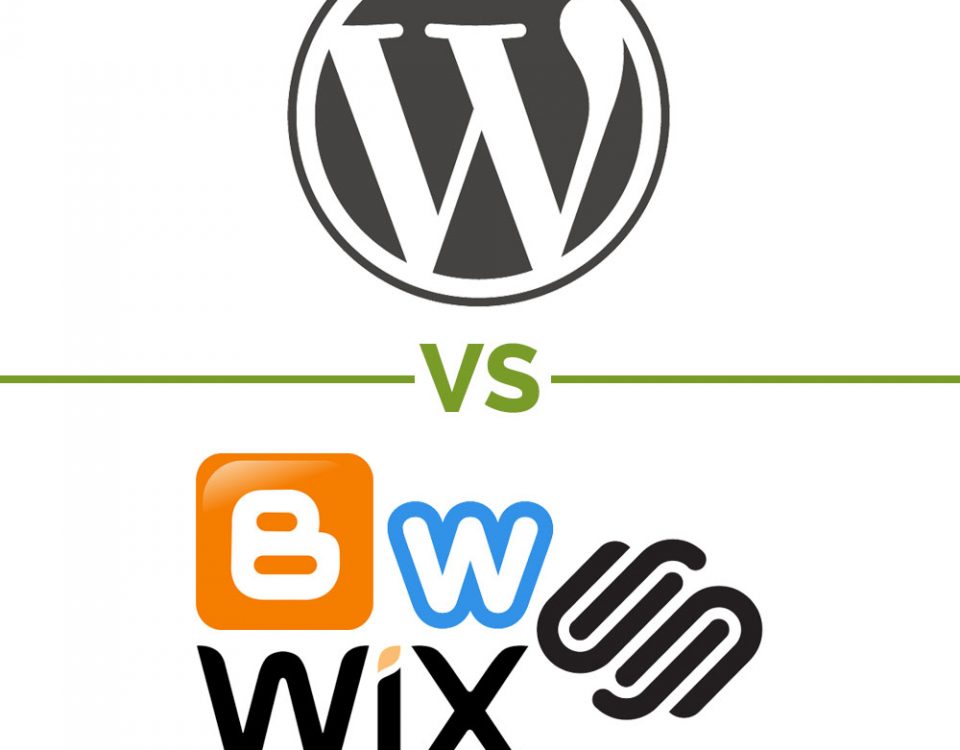
WordPress vs Website Builders: Designs & Layouts
November 2, 2016
WordPress vs Website Builders: eCommerce
November 16, 2016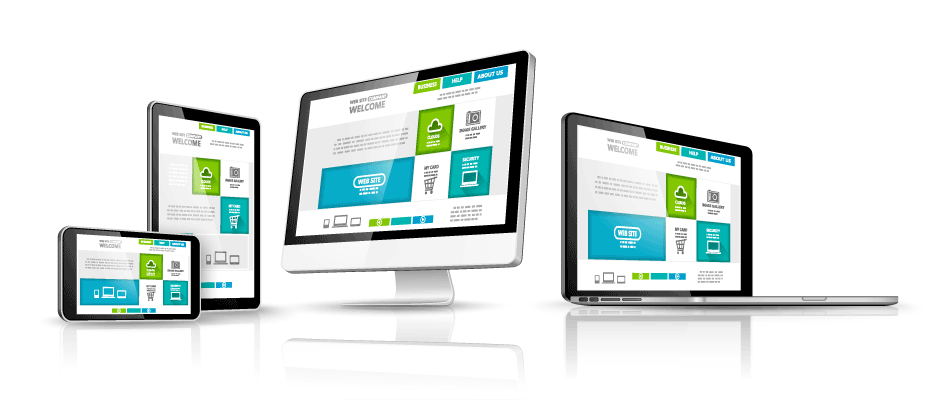
WordPress
Website Builders (i.e. Wix, SquareSpace, Weebly, Blogger, and GoDaddy’s Website Builder)
Words to Know
Flexibility & Extensibility
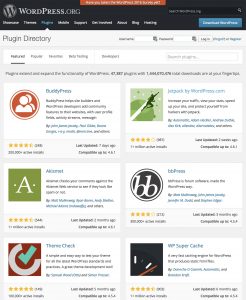 The core code for WordPress is built to be lean and lightweight to maximize flexibility and minimize code bloat. Code bloat is what you get when you try to shove too much unneeded functionality into a CMS resulting in slower website load times, more security holes and minimized user-friendliness. For example, a church website doesn’t need a way to sell products online, but a lamp store does. How do you make WordPress work for both of them? You don’t ship WordPress core files with an online store. You leave that function up to a plugin that can be easily installed by the website owner. The website owner is also able to choose from a bunch of different online store plugins to find the one that works within her workflow and how she wants to conduct business online. Let’s take a closer look at plugins.
The core code for WordPress is built to be lean and lightweight to maximize flexibility and minimize code bloat. Code bloat is what you get when you try to shove too much unneeded functionality into a CMS resulting in slower website load times, more security holes and minimized user-friendliness. For example, a church website doesn’t need a way to sell products online, but a lamp store does. How do you make WordPress work for both of them? You don’t ship WordPress core files with an online store. You leave that function up to a plugin that can be easily installed by the website owner. The website owner is also able to choose from a bunch of different online store plugins to find the one that works within her workflow and how she wants to conduct business online. Let’s take a closer look at plugins.
Currently, the WordPress plugin directory lists 47,379 plugins and that number increases daily. Because WordPress is open-source, anyone can create a plugin and post it on the internet for someone to use. A lot of these plugins have overlapping functionality which means that you can try a few different ones and choose the one you like the best. We find the ratings system and reviews to be paramount in choosing a reputable plugin. It is recommended to get plugins directly from the WordPress directory or to pay for a premium plugin from a reputable third-party source such as Code Canyon. Do you want your website to display lyrics from Dolly Pardon on the administration dashboard? There’s a plugin for that (no, really, there is). You need a plugin to notify you when an alien visits your website? You may need to have that one custom-coded, which brings us to our next point.
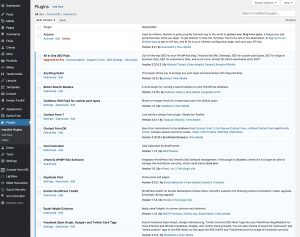 Additionally, someone with PHP coding experience can create their own plugin. We often create plugins for clients when we can’t find a satisfactory plugin readily available. We also modify plugins when they aren’t exactly tailored to our client’s needs. The best part about creating plugins is you can create a plugin with just a few lines of code because of the use of hooks throughout the code. A hook is a place to insert some additional code into specific parts of the WordPress core files. There are hundreds of hooks in which to place additional code and you can even create your own hooks easily in custom themes. Some theme makers provide hooks as well. Sorry if we lost you there, but the point is, these hooks are where flexibility and extensibility fuse together to magically create function where there was no function before. The options are limitless. You may have to pay for someone with coding experience to help you or you may have to pay for a premium plugin, but most of the plugins are free to use and more likely than not, they’ll do what you need them to do out of the box.
Additionally, someone with PHP coding experience can create their own plugin. We often create plugins for clients when we can’t find a satisfactory plugin readily available. We also modify plugins when they aren’t exactly tailored to our client’s needs. The best part about creating plugins is you can create a plugin with just a few lines of code because of the use of hooks throughout the code. A hook is a place to insert some additional code into specific parts of the WordPress core files. There are hundreds of hooks in which to place additional code and you can even create your own hooks easily in custom themes. Some theme makers provide hooks as well. Sorry if we lost you there, but the point is, these hooks are where flexibility and extensibility fuse together to magically create function where there was no function before. The options are limitless. You may have to pay for someone with coding experience to help you or you may have to pay for a premium plugin, but most of the plugins are free to use and more likely than not, they’ll do what you need them to do out of the box.
Finally, if you want to change the look of your website later, it’s not a problem. WordPress is extremely flexible and allows you to keep all your content but give the design a refresh with minimal work.
Summary
Because of the large number of plugins available for WordPress and the use of hooks throughout the WordPress core files as well as the ability to easily change the look of a website, we give it a 10 out of 10 for flexibility and extensibility.
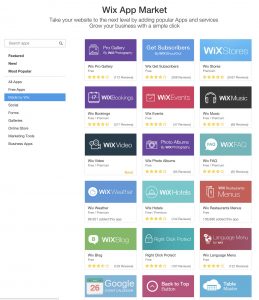 Website Builders such Wix, SquareSpace, Weebly, Blogger, and GoDaddy’s Website Builder are proprietary systems which mean they are closed to outsiders making any coding changes. On the one hand, this means the plugins (or apps as Wix calls them) that are created for one of these Website Builders are coded by the company who owns the builder and therefore, the plugin should always work. In other words, in an open-source system like WordPress, multiple authors of plugins means that one plugin may stop another plugin from functioning correctly or a theme may be blocking a plugin from working. But every plugin created for a Website Builder is done by the same company and therefore, testing is done to make sure a plugin plays nicely with other plugins and with all the templates.
Website Builders such Wix, SquareSpace, Weebly, Blogger, and GoDaddy’s Website Builder are proprietary systems which mean they are closed to outsiders making any coding changes. On the one hand, this means the plugins (or apps as Wix calls them) that are created for one of these Website Builders are coded by the company who owns the builder and therefore, the plugin should always work. In other words, in an open-source system like WordPress, multiple authors of plugins means that one plugin may stop another plugin from functioning correctly or a theme may be blocking a plugin from working. But every plugin created for a Website Builder is done by the same company and therefore, testing is done to make sure a plugin plays nicely with other plugins and with all the templates.
On the other hand, this means that there aren’t as many diverse plugins or apps available. If you want a home page slideshow, you may only get the choice of one plugin or app which may or may not have all the functionality you desire and since you can’t modify the plugin or any of the source code, you’re stuck with what they give you. Alternately, a Website Builder may not use plugins or apps at all and everything is built right into the system which diminishes flexibility and extensibility and also increases code bloat. Some Website Builders are trying to be so user-friendly, they don’t give you choices at all for extending functionality which may be okay for some website owners, but in a culture of choice, most people are used to getting just what they want.
Finally, if you want to change the look of your website, Website Builders aren’t flexible enough to handle this. You will have to start all over by creating all new content within a new template.
Summary
While Website Builders such as Wix, SquareSpace, Weebly, Blogger, and GoDaddy’s Website Builder advertise that all the functionality you could want is built right into their builders or that they offer a selection of high-quality plugins or apps to extend functionality, their choices are very limited and no customization of the code can be done. Also, if you want to change the look of your site later, you can’t do that without redoing all the content. That is why we give Website Builders a 5 out of 10 for flexibility and extensibility.

